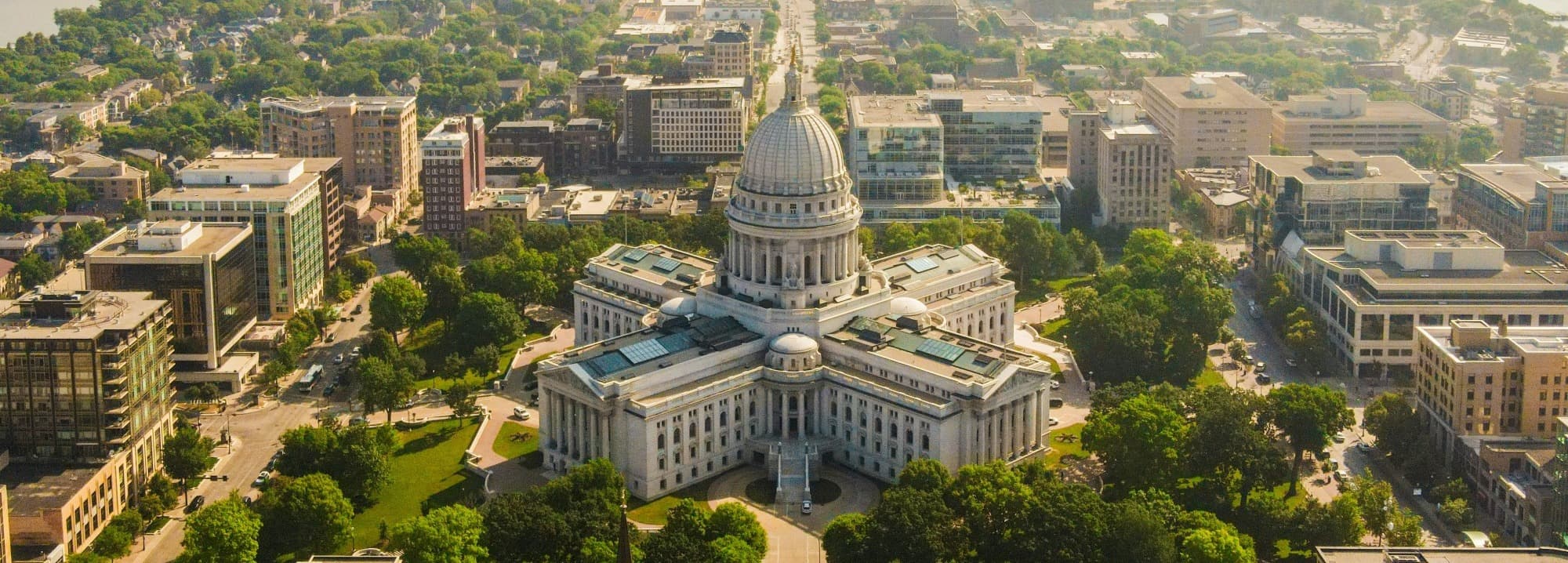
10 Reasons to Run as an Independent Candidate in Wisconsin
Wisconsin is known for its diverse political landscape and critical role in presidential elections, which offers unique opportunities for independent candidates. The state has a significant proportion of independent voters and a dynamic political climate. These factors make Wisconsin a fertile ground for those who are looking to make an impact outside of the traditional party system.
Join us as we explore Wisconsin's political history and environment. We’ll then use information about the Badger State to outline 10 compelling reasons why you should run for office as an independent in Wisconsin in 2024.
Wisconsin's Political and Voting History
Wisconsin has a rich political heritage that’s characterized by its swing state status in presidential elections. Historically, the state has alternated between Republican and Democratic preferences, indicating a diverse and open-minded electorate. Since 2019, the Democrats have held the Governor’s seat while the Republicans hold majorities in both chambers of the State House. No executive offices are up for grabs in 2024.
Most notably, Wisconsin is ranked 8th in the nation for its percentage of independent voters, highlighting its receptivity to nonpartisan candidates.
In conjunction with ongoing disputes about redistricting in Wisconsin, recent election reforms and shifts in voter sentiment have further opened doors for independents. The state's political landscape is ripe for candidates who can appeal to centrist and independent-minded voters who are disillusioned with the two-party system.
Wisconsin's political landscape is unique in several ways:
Swing State Status: Wisconsin is known as a quintessential swing state in presidential elections, often playing a pivotal role in deciding the outcome. In the last two general elections, the winner was decided in Wisconsin by less than 1% of the vote. Its electorate is known for being capable of swinging either way, which makes it particularly interesting and important in national politics.
Progressive History: Wisconsin has a rich history of progressivism. It was the birthplace of the Progressive Party in the early 20th century, led by former governor Robert M. La Follette during his 1924 presidential bid. The party advocated for reforms like women's suffrage and workers' rights.
Mixed Urban-Rural Divide: The state has a mix of urban areas (like Milwaukee and Madison) and vast rural regions. This diversity creates a varied political climate where different issues resonate differently across the state.
Labor and Union Legacy: Wisconsin has a strong history of labor unions and was a pioneer in workers' rights. However, in recent years, there have been significant political battles over union rights, notably the 2011 Wisconsin Act 10, which limited collective bargaining for most public employees.
Education and Environmental Issues: The state has a strong tradition of valuing education and environmental conservation, often leading to significant political discussions and policies in these areas. In-state polling shows that climate change is a major concern for voters in Wisconsin.
Notable Independent Politicians from Wisconsin
While Wisconsin is traditionally seen as a stronghold for the establishment parties, it has a history of supporting progressive and independent movements. In six out of the past eight presidential elections, the number of independent voters has been larger than the margin of difference between votes for either major party candidate.
Wisconsin has seen various independent or third-party candidates over the years. Some notable figures include:
Ed Thompson: The brother of former Governor Tommy Thompson, Ed ran for governor in 2002 as a Libertarian, garnering a significant amount of attention and votes for a third-party candidate. He also served as mayor of Tomah, Wisconsin.
Joseph Kexel: A frequent independent or third-party candidate, Kexel has run for various offices, including the U.S. Senate, while advocating for smaller government and individual liberties.
Pressing Political Issues Facing Wisconsin Voters
According to an informal survey of Milwaukee Journal Sentinel readers, the top two concerns going into the 2022 midterms were the future of our democracy (38%) and the economy (12.3%). More recent data shows that these concerns have increased as we move closer to the November 5, 2024 general election.
These six issues are top of mind for voters in Wisconsin this election year:
Economic Issues: Economic recovery, especially post-COVID-19, remains a significant concern. This includes the worker shortage, support for small businesses, tax cuts for the middle class, and handling of the state's budget.
Healthcare: Accessibility and affordability of healthcare are critical issues for many Wisconsin residents. As with much of the country, abortion is also a hot topic for Wisconsin voters in the coming elections.
Education: Funding for public education, including the support for and debate around school choice programs, is a significant topic in Wisconsin politics. Voters are also looking for more accountability and transparency from the education system.
Environmental Concerns: Issues such as conservation of the state's natural resources, water quality (particularly in rural areas), and sustainable farming practices are important to many Wisconsin voters.
Infrastructure: With a mix of urban and rural areas, the state faces challenges in maintaining and upgrading its infrastructure, including roads, bridges, and internet connectivity.
Political Polarization: Wisconsin faces a high level of political polarization, with stark differences between urban and rural areas. Bridging this divide is a growing concern among many voters.
As you can see, Wisconsin's political uniqueness lies in its swing state status, progressive history, and urban-rural divide. While independent candidates have historically faced challenges, the diverse issues facing Wisconsin voters, ranging from economic recovery to political polarization, provide a broad platform for independents to engage with the electorate.
10 Reasons to Launch an Independent Campaign in Wisconsin
Understanding the issues facing voters in your community is essential for independent politicians in Wisconsin. If you’re looking for more inspiration to run in 2024, here are 10 solid reasons to enter politics in Wisconsin this election year:
Reason #1: Strong Independent Voter Base
With Wisconsin ranking high in its independent voter percentage, there is a substantial base for candidates who can appeal to this group's diverse concerns and priorities.
Reason #2: Political Balance
Wisconsin's reputation as a battleground state reflects its balanced political landscape. However, it could also offer opportunities for independents to sway voters who are dissatisfied with the binary choices of the major parties.
Reason #3: Open Political Field
In 2024, Wisconsin has at least 125 seats up for election. This large number presents numerous opportunities for new entrants, especially in districts that have seen little competition in recent years.
Reason #4: Key State Issues
Wisconsin faces unique challenges in areas like dairy farming, manufacturing, and environmental conservation. Independents can address these issues without the constraints of party lines.
Reason #5: Community-Centric Politics
Wisconsin residents often value local, community-driven solutions. Independent candidates focusing on hyper-local issues can gain significant traction.
Reason #6: Growing Discontent with Partisanship
Both nationally and within Wisconsin, there is an increasing frustration with partisan politics. Independents can capitalize on this sentiment by offering a fresh alternative to Democrats and Republicans.
Reason #7: Strong Tradition of Progressive Movements
Wisconsin's history of progressive and labor movements provides a rich context for independents. This is particularly true for those who would advocate for social and economic reforms. Remember that independent doesn’t have to mean centrist or moderate.
Reason #8: Innovative Policy Solutions
Independent candidates have the freedom to propose innovative and unconventional solutions to Wisconsin's challenges, especially those in education and healthcare.
Reason #9: Diverse Electorate
The state's demographic diversity, including urban, rural, and suburban voters, allows independents to tailor their messages to different communities effectively. This could help an independent candidate reach voters who feel marginalized or unseen by traditional party candidates.
Reason #10: National Spotlight
Due to its critical role in national politics, running for office in Wisconsin can attract significant attention, providing a platform to influence broader political discourse.
Running for Office in Wisconsin
For those considering a run for office in Wisconsin, understanding the state's unique political climate is crucial. Engaging with local communities, addressing state-specific issues, and leveraging the significant independent voter base are key strategies for a successful campaign.
State and Local Races in 2024
With local races being the only other items on the ballot in 2024 besides one U.S. Senate seat and the Presidential nominees, voters in Wisconsin can focus on choosing the best candidates to represent their community interests. Since the majority of these local elected offices are nonpartisan, it’s a good time for indie candidates to make an impression on voters.
There are over 125 seats up for election in 2024, which provides ample opportunity for independents to file for office and raise awareness for their campaigns. This includes not only legislative seats but also potentially influential local positions.
For example, all 99 seats in the State Assembly are open. Those races will be decided on the November 5, 2024 general election ballot.
County Board of Supervisor elections will be held in all 72 counties in Wisconsin on April 2, 2024. Dade and Milwaukee Counties are looking for a new County Executive.
The following cities in Wisconsin are electing a new mayor during the spring elections:
Milwaukee residents will also vote in a new DA and City Attorney. The city is also electing new school board members in five of the city’s school districts.
Due to various essential issues being played out in the courts, some of the biggest races are in the state’s court system. Qualified independents will find that 46 of the 56 available seats on the Circuit Court are uncontested races.
Tips for Independent Candidates in Wisconsin
Once you’ve decided to run for office, it’s important to leverage the local advantage by following some best practices for independent campaigning:
Address Wisconsin-specific issues, like agricultural policies and environmental concerns.
Engage with both urban and rural communities, taking into account and understanding their distinct needs.
Utilize Wisconsin's independent voter base, emphasizing nonpartisan goals, policies, and values.
Focus on innovative solutions for state challenges, such as education reform.
Heed important dates and deadlines for the 2024 Elections
Election Dates and Filing Deadlines for Wisconsin
Independent candidates should be aware of these key dates:
There is primary on February 20, 2024, and an election for local positions like mayor and city council on April 2, 2024. The filing deadline for the general election is on June 3, 2024, and November 5, 2024 is the date for the general election.
These timelines are crucial for planning a successful campaign.
Get Support for Your 2024 Independent Campaign in Wisconsin
Wisconsin's political landscape in 2024 presents a unique opportunity for independent candidates. With its significant number of independent voters, history of progressive movements, and status as a battleground state, Wisconsin is a strategic choice for those seeking to make an impact outside the traditional party system.
Whether addressing local issues or leveraging the state's national significance, running as an independent in Wisconsin can be a rewarding and impactful endeavor.
But, running as an independent doesn’t mean running alone. You can get help for your campaign and free access to resources and tools when you partner with the team at GoodParty.org.
We’re not a political party. We’re a growing movement of independent voters and politicians who are on a mission to create a political system that works for everyone.
Photo by Nils Huenerfuerst on Unsplash
